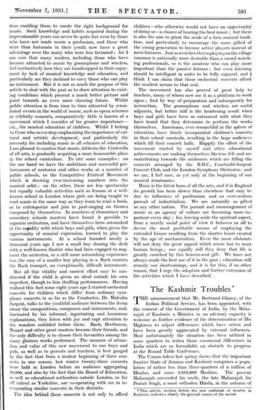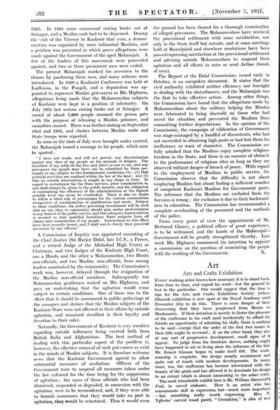The Kashmir Troubles *
THE announcement that Mr. Bertrand Glancy, of the Indian Political Service, has been appointed, with the consent of the Government of India, by the Maha- rajah of Kashmir, a Minister in an advisory capacity is welcome as further evidence of the determination of His Highness to adjust differences which have arisen and have been greatly aggravated by external influences. Most unfortunately the situation has been utilized in some quarters to widen those communal differences in India which are so formidable an obstacle to progress at the Round Table Conference.
The Census taken last spring shows that the important frontier State of Jammu and Kashmir comprises a popu- lation of rather less than three-quarters of a million of Hindus, and some 2,818,000 Muslims. The present Maharajah succeeded his uncle, the late Maharajah Sir Pratab Singh, a most orthodox Hindu, in the autumn of
.* This article, written before the new outbreak of trouble in Kashmir, indicates clearly the general causes of the unrest.
1925. In 1924 some communal rioting broke out at Srinagar, and a Muslim mob had to be dispersed. During the visit of the Viceroy to Kashmir that year, a demon- stration was organized by some influential Muslims, and a petition was presented in which grave allegations were made against the Government of the aged Maharajah. A few of the leaders of this movement were proceeded against, and two or three prominent men were exiled.
The present Maharajah marked his accession to the throne by pardoning these men, and many reforms were introduced. In 1929 a Kashmiri Conference was held at Ludhiana, in the Punjab, and a deputation was ap- pointed to represent Muslim grievances to His Highness, allegations being made that the Mohammedan subjects of Kashmir were kept in a position of inferiority. On July 13th last serious rioting broke out at Srinagar. A crowd of about 5,000 people .stormed the prison gate with the purpose of releasing a Muslim prisoner, and casualties ensued. There was further rioting on September 23rd and 24th, and clashes between Muslim mobs and State troops were reported.
As soon as the riots of July were brought under control, the Maharajah issued a message to his people, which may be quoted : " I have not made, and will not permit, any discrimination against any class of my people on the grounds of religion. The humblest of my subjects has free and direct access to me, and any grievances my people may have can be submitted by them per- sonally to me, subject to two fundamental conditions, viz.: (1) that political activities are confined within the law of the land ; and (2) that no outside intervention is sought in any shape or form. In regard to recruitment for the State services, prior consideration is, and shall always be, given to the public interest, and the obligation of maintaining the efficiency of the administration at the highest possible level can never be overlooked. There is also no desire to follow a blind rule of percentages for the various communities irrespective of considerations of qualification and merit. Subject to these conditions, the policy governing recruitment will be such that no one class or community should gain undue predominance in any branch of the public service, and that adequate representation is secured to duly qualified hereditary State subjects from all classes and communities of my people. Instructions to this effect have been recently issued, and I shall watch closely their practical ucecution by my officers."
A Commission of Inquiry was appointed consisting of the Chief Justice (Sir Burjor Dalal, late I.C.S., a Parsee, and a retired Judge of the Allahabad High Court) as Chairman, and two Judges of the Kashmir High Court, one a Hindu and the other a Mohammedan, two Hindu non-officials, and two Muslim non-officials, from among leaders nominated by the community. The Commission's work was, however, delayed through the resignation of the Muslim non-official members. Subsequently ten Mohammedan gentlemen waited on His Highness, and gave an undertaking that the agitation would cease subject to certain conditions. One of these was to the effect that it should be announced in public gatherings at the mosques and shrines that the Muslim subjects of the Kashmir State were not affected in their affairs by outside agitation, and remained steadfast in their loyalty and devotion to their ruler.
Naturally, the Government of Kashmir is very sensitive regarding outside influences being exerted both from British India and Afghanistan. The best method of dealing with this particular aspect of the problem is, however, the effective removal of such grievances as exist in the minds of Muslim subjects. It is therefore welcome news that the Kashmir Government agreed to allow substantial measures of mediation. Officers of the Government were to suspend all measures taken under the law enforced for the time being for the suppression of agitation ; the cases of those officials who had been dismissed, suspended or degraded, in connexion with the agitation, were to be reconsidered, and, if they were able to furnish assurances that they would take no part in agitation, theprould be reinstated. Thus it would-seem the ground has been cleared for a thorough examination of alleged grievances. The Mohammedans have received the provisional settlement with some satisfaction, not only in the State itself but outside, and at mass meetings held at Rawalpindi and elsewhere resolutions have been passed expressing satisfaction at the provisional settlement and advising outside Mohammedans to suspend their agitation and all efforts to raise or send Jathas (bands of men).
The Report of the Dalal Commission, issued early in October, is an outspoken document. It states that the civil authority exhibited neither efficiency nor foresight in dealing with the disturbances, and the Maharajah was the first to take effective action. Among other things, the Commission have found that the allegations made by Mohammedans about the military helping the Hindus were fabricated to bring discredit on those who had saved the situation and prevented the Muslims from committing further depredations. In the opinion of the Commission, the campaign of vilification of Government was stage-managed by a handful of discontents, who had not succeeded in obtaining high posts or had lost them for inefficiency or want of character. The Commission are fully satisfied that the Muslims enjoy complete religious freedom in the State, and there is no manner of obstacle to the performance of religious rites so long as they are observed without danger of breach of peace. With regard to the employment of Muslims in public service, the Commission observe that the difficulty is not about employing Muslims but about finding a sufficient number of competent Kashmiri Muslims for Government posts. The inference that the Muslims are excluded from the Services is wrong ; the exclusion is due to their backward- ness in education. The Commission has recommended a complete overhauling of the personnel and the methods of the police.
From every point of view the appointment of Mr. Bertrand Glancy, a political officer of great experience, is to be welcomed, and the hands of the Maharajah's Government will be greatly strengthened thereby. Last week His Highness announced his intention to appoint a commission on the question of associating the people with the working of the Government. X.















































 Previous page
Previous page